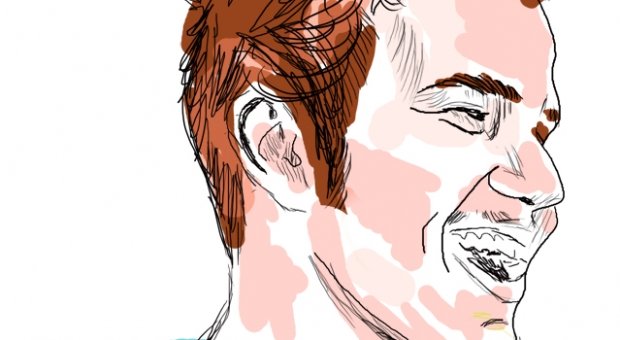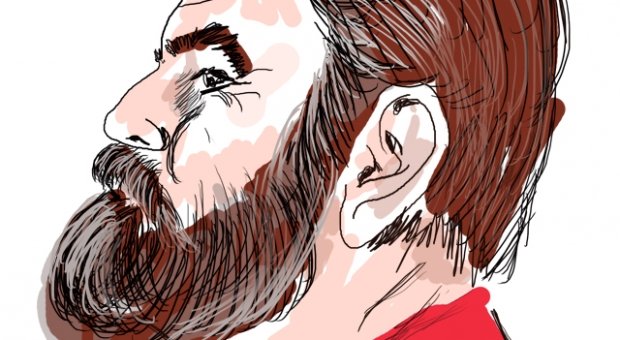
Credit: John Webster
The summer I turned 20, I shared a house in downtown Toronto with four other guys I’d met at Gays at York University (GAY). It was the late 1970s — the Harvey Milk era — but I hadn’t joined the group because I felt fired up for revolution. It was my first time away from home. I wanted to make friends and fuck around.
I dated a couple of the guys at GAY and tricked with a few others, but it was the friendships and burgeoning political awareness we shared that changed my life. It was only a few years after Stonewall.
Back then, Stonewall was mostly a name to us. We knew little about New York’s revolutionary 1969 gay rights riots, when pissed-off young people in their late teens and 20s went wild in the streets of Manhattan’s West Village, dismaying older gays who had different ideas about how to achieve social equality.
But we sensed that, thanks to Stonewall, there was a chance we could avoid becoming one of the spooky gay stereotypes we’d grown up with — like the over-40 crowd at the bar that eyeballed us over their drinks and rarely (to us) looked happy, except when “camping” it up with caustic one-liners oozing double entendre, calling one another “Mary” or “girl” while they checked out our “baskets.”
Some of my friends called them “trolls.” The part of the bar where they hung out was “the wrinkle room.” Conversely, we were “twinks.” “Chicken” was another word for twink; “chickenhawk” another for troll.
None of us knew that their arch language had a history. You can hear vestiges of it in contemporary drag discourse. Called Polari, the vocabulary started catching on in the 18th century, in backstreet English watering holes called molly houses where homosexuals “served” each other attitude and “read” each other for sex.
Their banter sounded out of step to us. Our generation was striding out of the closet onto the street. We needed something pithy for our placards as we stormed the political podium.
Oppression and quiet resistance shaped the way the gay men before me communicated with one another. Revolution and defiance shaped how my generation communicated. Today, young men are talking in terms of enlightenment.
They’re not ashamed. They’re not enraged. They’re interested in self-discovery and self-identity. We had a group mentality. Theirs is individualistic, yet open to diversity.
An unsexy, academic-sounding phrase like “gender fluidity” would have been incomprehensible pre-AIDS and irrelevant during the worst years of the epidemic. Now it’s popping up all over the place, as more and more stories about the gay generation gap appear in the media and on blogs.
A good example is 40-year-old Michael Schulman’s New York Times article “Generation LGBTQIA,” about “a new generation of post-gay gender activists” for whom same-sex marriage, the right to join the armed forces and other so-called freedoms are fine and dandy but don’t have much to do with how they want to define themselves.
They don’t respond to the rhetoric of my generation’s fight for equal rights any more than young women today can relate to the hunger strikes of suffragettes or the bra-burning, man-hating semantics of mid-20th-century feminism.
Generation LGBTQIA’s style of activism dismays some members of my generation as much as our style dismayed members of the previous gay generation.
As young queers forge identities shaped by their own experiences, some of their predecessors are lashing out, convinced that their hardships, struggles and achievements are being trivialized or, worse yet, forgotten.
“Of course, 20-somethings are more insufferable than they used to be, straight or gay,” Kelvin Browne writes in a Globe and Mail op-ed, “The Gay Generation Gap.” To Browne, young gay men are “obsessed with celebrity and wealth” and take their rights for granted.
“We will look at them,” middle-aged Mark Harris says in his insightful New York magazine story, also titled “The Gay Generation Gap.” “They will look at us. We will realize that we have absolutely nothing to say to one another. And the gay generation gap will widen.”
Cue the ominous end-of-scene music.
Surprisingly, Harris then suggests that this may be a good thing. He might be right. After all, I wouldn’t be writing this unless there had been a widening generation gap in the 1960s and ’70s that inspired new ideas and led to massive social change.
My generation inherited an underground subculture stifled by shame. We pushed together hard until we were aboveground. When AIDS hit, we pushed together even harder to stay aboveground. We had a common purpose and a clear direction.
What purpose do young gay men have? Consequently, what direction?
Margaret Mead might have had something to say about it, if she were alive. The late American cultural anthropologist identified three types of cultures.
Straight people belong to a post-figurative culture, one that’s been around for ages, is set in its ways and in which everyone knows what’s what. It’s shaped by the past, and the young folk learn from the old folk.
We’re at the other end, living in Mead’s pre-figurative culture. Change has been pervasive and profound. There is no past. The present is in flux. The future will shape the future.
The Gay Generation Gap: Communicating across the LGBT Generational Divide, a 2005 publication by the Institute for Gay and Lesbian Strategic Studies (IGLSS), discusses Mead’s observations at length and suggests ways we could communicate better.
The words community and communication share the same etymological DNA. Derived from Latin, one means “common, public, general, shared by all or many,” while the second means “to make common.” You can’t have one without the other.
Some gay male writers and activists have recently suggested that we should not talk about ourselves as a community, but as a population. Without the first one, the second one dies. George Orwell and Aldous Huxley wrote about what it’s like to be a population without a sense of community, and it isn’t pretty.
The IGLSS article cites the breakneck speed of historical change we’ve witnessed in just a few decades and proposes that my generation’s activism planted the seed for a brand new culture that has too few reference points for young people. Pink triangles and rainbow flags are not enough.
The authors advocate a reversal of roles, recommending that my generation step back so the new generation can take the lead. They’re going places we’ve never been.
If gay men my age don’t put the past into perspective and acknowledge that the new generation looks at life through a different lens, they’ll move forward without us.
If we can’t offer them the advantages of our experiences and resources without proselytizing, we will have missed an opportunity to influence the development of a culture we helped create.
First we need to get over our martyr complex.
Last August, 25-year-old Jordan Bach appeared as a guest on Morning Jolt, a popular call-in talk show on America’s queer Sirius radio channel, OutQ, hosted by Larry Flick.
Bach is a blogger who wants to “inspire gays to discover the best in themselves… in a way that is enlightening and uplifting, not sarcastic or overly eroticized.” He has more than 16,000 unsolicited friends on Facebook and thousands of followers on Twitter.
Flick is a well-known pop music journalist and kind of a big deal in the American bear community. He spent the interview disrespecting Bach, talking over him and refusing to listen to anything his young guest had to say.
“You need to read more… I have the bodies of dead people on my shoulders… We are not a community. The sooner you learn that, the better off you’ll be… The only thing we have in common is that we like dick.”
Bach was too polite to give it back in kind and in this case too young to realize that the radio host was “serving” him. Their communication styles reflected their generational differences. One was confrontational, the other acquiescent.
So I called Bach myself to find out if we had anything else in common other than enjoying penises. I brushed off the dead bodies on my shoulders while I waited for him to answer.
“If one gay gets attention, then another gay thinks it’s being taken away,” Bach says good-naturedly by phone from his apartment in NYC’s East Village, maturely offering an excuse for Flick’s behaviour.
Bach is not ready to dismiss us as a community. He points to ongoing similarities in our shared history, such as feeling rejected by family or society during our early formative years.
“I came out when I was 12,” he says. “I was sitting at the kitchen counter when my mother turned to me and asked, ‘Do you think you’re gay?’ My family’s support was really important. Boston has a reputation for being liberal and hippie-ish, but we lived in the suburbs, where there was a conservative Yankee mindset. So I internalized that I was weird and outside the norm.”
He tells me how his mother used to go to Studio 54 and that he grew up surrounded by “gay uncles” whose stories enthralled him.
He recalls moving to New York to study fashion at Parsons with his best friend, who is now a trans woman, and how reading Larry Kramer’s The Tragedy of Today’s Gays affected him.
We discover a mutual admiration for the great 20th-century African-American gay writer James Baldwin (Go Tell It on the Mountain, Giovanni’s Room, The Fire Next Time).
Then the issue of gay male identity comes up.
“I’m interested in talking about personal development and spiritual concerns as a gay man, and how to build deeper connections with people,” Bach says. “I know it all sounds so idealistic, but I don’t believe in scarcity. There is room for everyone. Diversity is the basis on which we create. It’s not a gay thing; it’s a human thing.”
The most telling part of our hour-and-a-half-long conversation is Bach’s gratitude. He’s used to being lectured by guys like me, not listened to and, most importantly, not heard.
I’m pleased to find out that we have a lot in common, despite the time warp. We both agree that our dialogue has been an inspiring experience. I walk away with a much higher regard for the optimism and motivation of Bach’s generation.
In Vancouver, Totally Outright is trying to harness that optimism and motivation while bridging the gay generation gap.
“One of our goals is to connect to community and build some kind of capacity for guys to connect,” says Daniel McGraw, 23, who works for the Health Initiative for Men (HIM).
McGraw is coordinating the eighth annual Totally Outright series of workshops for gay men aged 18 to 26 over two weekends in March. The workshops cover a range of issues, from gay men’s history, to gay men’s health, as well as communication and community-outreach skills. Some of the speakers are men my age.
“We couldn’t see the new generations of leaders. It’s often not a lack of willingness or potential to learn that’s the problem,” McGraw says, pointing instead to a lack of intergenerational mentorship and, more importantly, mutual listening.
“Maybe some of them have only had bad experiences with ‘old leches’ at The Junction,” he adds lightheartedly, and I am briefly transported back to the “wrinkle room” of my youth.
For more information about Totally Outright, or to apply, email totallyoutright@checkhimout.ca.

 Why you can trust Xtra
Why you can trust Xtra


